Creation: The Argument

A Sunday guest post by my brilliant husband, Gregg.
Every Sunday, my clever husband offers me a “day of rest” by writing posts on the subject of his primary ministry. This is a topic that is gaining more and more attention in our modern culture. The topic, Creationism vs. Darwinism, is a subject that has broad reaching scientific, social, and metaphysical implications. He chooses to conclude each post with a message intended to hearten and bolster believers. However, for believers and non-believers alike, the primary purpose is to present scientific, historical, logical, and/or sociological data in an empirical fashion, as much as possible written in layman’s terms, and in a format suitable for supplementing any homeschool curriculum whether you choose to believe the Biblical account — or secular guesses — about the origins of human life on earth.
A Darwinian Primer
The 6 types of evolution taught in the average public school, the first 5 being types of Darwinian evolution, and the last being simple modifications or changes within kind and not even really “evolution” are:
- Cosmic evolution
- Stellar evolution
- Chemical evolution
- Abiogenesis—Life from non-life
- Macro-evolution
- Micro-evolution (Changes within kind – not evolution)
The Argument
I have dedicated the last several posts to the topic of abiogenesis, or spontaneous generation, which is the Darwinists belief that life can magically spring from rocks and water. Before I wade into the morass of macro-evolution, which is the Darwinist belief that one species can magically change into an entirely different species, just add time and randomness, I felt it was important to reflect upon the basic formal argument for Darwinism as a religious belief.
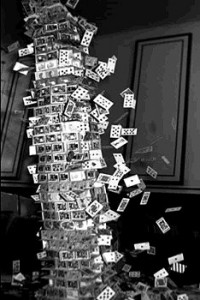 A House of Cards Built on Lies
A House of Cards Built on Lies
There are three primary premises to the Darwinian argument. These amount to articles of faith and Darwinists desperately cling to them.
The beliefs are:
- Randomness can lead to the irreducibly complex ordered structures and organized systems that make up all living things
- Natural Selection can lead to macroevolutionary change
- Mutation can lead to macroevolutionary change
If these are the premises of the argument, then the conclusion that naturally follows is:
- Nature is all there is
— or —
a corollary conclusion:
- God must not exist.
The problem Darwinists face with this entire argument is that every single premise is utterly and hopelessly wrong. The bigger problem is that when these foundational beliefs are shown to be false, the entire argument falls apart much like ripping the tablecloth out from beneath a house of cards.
Methodology of the Darwinist Lie
The part that strikes me as offensive and insidious is the manner in which this lie is peddled. In short, if one can be tricked into believing that the initial premises of the Darwinist model are accurate, or even possible, then it is further possible to buy into the conclusion. The methodologies Darwinists employ to sell this lie are the exact same social engineering methodologies employed by con-men (confidence men) when suckering their chosen marks.
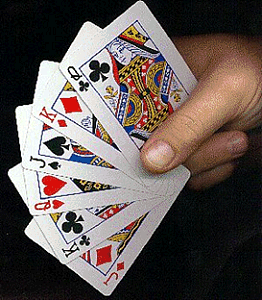 If Darwinists can gain your confidence, fool you into believing that your self-interest is somehow better served by their lies, then they can fleece you with ease. In the process, the mark will lose the ability to think critically, employ sound logic, make strict moral judgments, or see the man behind the curtain.
If Darwinists can gain your confidence, fool you into believing that your self-interest is somehow better served by their lies, then they can fleece you with ease. In the process, the mark will lose the ability to think critically, employ sound logic, make strict moral judgments, or see the man behind the curtain.
The lie starts with the age of the universe and the age of the earth (Cosmic Evolution). It continues with how stars were magically formed (Stellar Evolution), then how heavier elements magically came to be (Chemical Evolution). It further continues with how life magically sprung fully formed from rocks and water (Abiogenesis). It concludes with how more and more complexity and specific information is magically added to “simplistic” life forms so that the species barrier is bridged (Macro-Evolution).
If you know anything about real science, you know that there is not one single Darwinian lie that stands up under close scrutiny. It is all a sham, a scam, a mendacious construct — a lie.
Randomness
Random disorder and random events only ever lead to entropy, or further disorder. The nature of disorder is that it never organizes itself. Never. It remains random. This is why it is called “random” in the first place. There is no rhyme, reason, or rhythm to randomness. There is no organization, no pattern, no template that is not put in place by order. Order is always defined as an act of an intelligent agent.
Darwinists like to point to the simple order demonstrated by bubbles and crystallization. These form as a result of ordered laws at the molecular level. What these structures never do is “evolve” into more complex structures. They cannot add to the information they already contain.
The fact is that randomness cannot ever generate the kind of highly specific zero tolerance for error order found in even the simplest protein chain.
Information
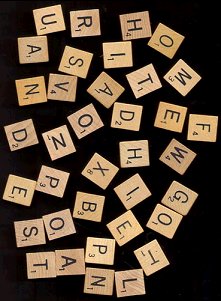 There are two sides to information. There is the given information and the received information.
There are two sides to information. There is the given information and the received information.
For example, if you have a bag of scrabble chips and you randomly select three letters over and over, eventually you may select the letters that spell the word “DIE” and this would be, then, the given information.
Now, given the word, “DIE” we have to interpret it to then have our received information. Well, everyone knows that word means, basically, the end of life.
Everyone except German speaking people, that is.
In the German language, “DIE” is an article that means much the same as the word “the” means in the English language. Likewise, if we were to retrieve the word “NINE” it would have vastly different meanings between English and German and is utterly meaningless in literally thousands of other languages.
The point is that there has to be an intelligent agent in order to interpret any given information. Without an intelligent agent that architects both sides of the information, the information is utterly and completely useless. The world’s most complete Encyclopedia is utterly useless to someone who cannot read it.
Likewise, the encoded language of proteins, RNA, and DNA are utterly useless without an intelligent agency that can decode the instructions in them and put them to use.
If DNA is the library, who is the author? Randomness? Hardly.
How does a new page get added to a reference book? The fact is that we have only ever observed intelligent agents adding that information. Random processes do not and can never add organized, intelligent, specifically complex information. Random processes can only ever add disorder.
Natural Selection
Natural selection is a phrase that is a built in lie. Nature cannot think. Nature is mindless. Nature has no will, no facility to plan ahead, no intelligence with which to engineer, no desire to fix what is broken.
Nature cannot and does not select.
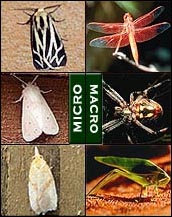 What Darwinists refer to as natural selection is actually just simple variation within a single species. It is very easy to achieve and not always driven by nature. For example, every hybrid variety of corn or tomato commonly grown today is the result of careful interbreeding to achieve a desired combination of traits.
What Darwinists refer to as natural selection is actually just simple variation within a single species. It is very easy to achieve and not always driven by nature. For example, every hybrid variety of corn or tomato commonly grown today is the result of careful interbreeding to achieve a desired combination of traits.
Interestingly enough, the Darwinian model of “natural selection” was rejected wholesale in the early part of the 20th century by — Darwinists. These so called Neo-Darwinists rebelled against the natural selection theory, saying that natural selection has never given evidence of being able to change one species into another — and is not able to do it. Guess what? They are exactly right.
Hybrid corn is still corn. Hybrid tomatoes are still tomatoes. You cannot “naturally select” corn until it turns into bananas or fish. It just doesn’t ever, ever happen no matter how much time and randomness you add to the equation.
Neo-Darwinists recognized that so-called “natural selection” cannot produce cross-species change. These “neo-Darwinists” decided that it is mutations which accomplish the changes, and that natural selection only provides the “finishing touches” to the species.
When it comes to “natural selection” the bottom line is that it cannot change one species into another species. And that is just a fact.
Mutation and Survival of the Fittest
 Mutations DO occur in nature. Mutations are considered either benign or malignant. Mutations that are categorized as benign mutations have almost no noticeable effect and mostly occur in gene sequences that do not code for proteins or complex instructions for processes.
Mutations DO occur in nature. Mutations are considered either benign or malignant. Mutations that are categorized as benign mutations have almost no noticeable effect and mostly occur in gene sequences that do not code for proteins or complex instructions for processes.
Some malignant mutations are simply lethal at the outset. For instance, Carpenter Gene mutations are 100% fatal 100% of the time.
Occasionally changes in offspring occur because of a serious mutational defect. These are malignant mutations. Such alterations nearly always weaken the individual that has them. A mutational change is NOT the normal variational reshuffling of the existing DNA code, but rather an actual change in one tiny item in the information of the code.
 We can talk all day about natural hybridization. White tulips and red tulips make white tulips and red tulips and pink tulips in subsequent generations. Rarely, white tulips result in a red tulip when the double recessives express. This isn’t a mutation. The information was already in the genes of the tulips and a red tulip, at the end of the day, is still a tulip when all is said and done. This is just the natural reshuffling of the DNA.
We can talk all day about natural hybridization. White tulips and red tulips make white tulips and red tulips and pink tulips in subsequent generations. Rarely, white tulips result in a red tulip when the double recessives express. This isn’t a mutation. The information was already in the genes of the tulips and a red tulip, at the end of the day, is still a tulip when all is said and done. This is just the natural reshuffling of the DNA.
The result of malignant mutation is that the perfection of the code has been irreparably damaged. The resultant offspring are weaker, often do not or cannot reproduce, and they are much more likely to die off.
Malignant mutations rarely result in any advantage on the Darwinian evolutionary scale. What advantage is found in an extra head, or a single eye?
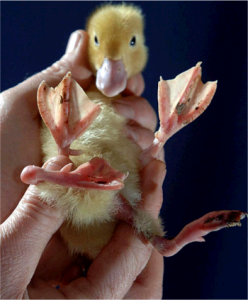 |
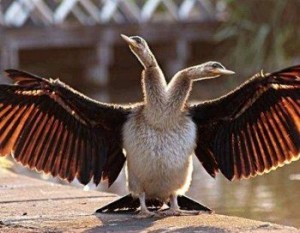 |
There is no Darwinian advantage to any of the extra useless appendages that occur in nature. There is no advantage to loss of sense, function, or cognition that would equal a more “fit” rating. Furthermore, mutations never add any new information to the genome – they only ever reduce the total information or repeat existing information.
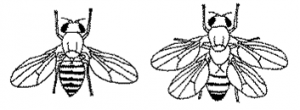 These days, textbooks use the mutant icon of the 4 winged fruit fly in an overt attempt to gain the confidence of school children that the Darwinian religion is factual. This is a good enough case study.
These days, textbooks use the mutant icon of the 4 winged fruit fly in an overt attempt to gain the confidence of school children that the Darwinian religion is factual. This is a good enough case study.
The four winged fruit fly does not occur naturally in nature. It is designed by intelligent scientists in laboratories. The four winged fruit fly doesn’t fly. It would be more accurately named the four winged fruit crawl. The four winged fruit fly cannot reproduce so it’s mutation does not have any chance at all to pass on to subsequent generations.
The New Argument
In light of all this information, the new argument looks like this:
- Randomness cannot lead to the irreducibly complex ordered structures and organized systems that make up all living things
- Natural Selection cannot lead to macroevolutionary change
- Mutation cannot lead to macroevolutionary change
Conclusion:
- Nature is not all that there is. There is more.
Summary
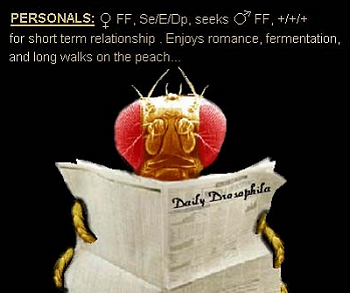 The past few weeks have been really difficult for me both personally and at work. My boss had to return home for medical reasons and I stepped into his shoes. This resulted in me having to perform both my own job in addition to covering his responsibilities. This meant I have been working insane hours and catching up on sleep in my off hours out of sheer exhaustion.
The past few weeks have been really difficult for me both personally and at work. My boss had to return home for medical reasons and I stepped into his shoes. This resulted in me having to perform both my own job in addition to covering his responsibilities. This meant I have been working insane hours and catching up on sleep in my off hours out of sheer exhaustion.
As I have had little time to focus on these Sunday posts in the past weeks, I have actually gained some clarity. It is clear to me that people are inclined to believe what they want to believe in the face of the facts.
For whatever reason, Darwinists have a radically different world view than those who know and understand the truth. They can isolate a single fact and ignore dozens of other facts that refute their interpretation of that single fact. They can successfully cling to a single thought and ignore every argument that leads up to that thought.
I just cannot bring myself to do that. I much prefer dealing with actual reality, actual science, and actual facts — ALL of them — with an open mind.
This week, I encourage my readers to look at the foundation of your own beliefs. Is there rot at the foundation, or a Rock? Is your ideology solid, or have you compromised your world view and your beliefs for the sake of fallible men?
I encourage you to go on a home-improvement spree in your spiritual dwelling.
God Bless you and yours.
Gregg
Resources:
Additional Posts dealing with Creation and Darwinism


I continue to think you are wrong.
.
The idea of ‘irreducible complexity’ is a sham which has not stood up to scrutiny.
.
Your three premises do not in fact lead to your two conclusions.
As you know, many, probably most Christians accept the idea of evolution and an old earth AND believe that the Christian idea of God is behind it all, having created the universe in such a way that this all would unfold as it has. (I’m not familiar with other religions.)
.
The idea of biological evolution does not require any of the things you have listed except the age of the earth. Whether the earth and the simplest bacterial forms were created in an instant (to use your word, ‘magically’), or whether they came about as a result of physical processes does not affect the evidence for biological evolution of all the multicellular species.
.
There is not ‘zero tolerance for error’ in a protein chain.
.
When you’re talking about information, it seems to me you’re leaving out the actual producers and readers of the information, the chemistry of the natural world. The information is in the molecular structure. What interprets the information of DNA and RNA and protein molecules is the molecular structure of other molecules.
.
Of course nature cannot think. That has nothing to do with what natural selection means.
Nature selects all the time without any intelligence. In a colder winter, some plants die that would have survived in a milder winter. This is selection. It requires no intelligence.
.
I think you are wrong in your statement about NeoDarwinism. I think the change was that there was more involved than only natural selection – for instance genetic drift in a population – not that natural selection was not a factor. But I’d have to check to be sure.
.
No matter how many times it is said, this statement is untrue:
“Furthermore, mutations never add any new information to the genome – they only ever reduce the total information or repeat existing information.”
I’m sorry you’ve been working insane hours.
(I’m responding to your posts because it is interesting and stimulating to my mind, but someone else could do a better job of answering, which gives me some regret.)
Only the firefly and a couple other types of insects have luminescence in the insect family. A few other types of fungus and invertebrates and bacteria have it. It is very uncommon.
The firefly is a beetle and there are many other types of beetles, almost all of which do not have bioluminescence. Where did this unique ability come from?
From your standpoint you have lots of choices. You could decide that the firefly was created separately from other beetles. You could even imagine that it was created that way for people to enjoy. Alternatively you could decide that this was a case of ‘microevolution’, because after all the firefly is still a beetle. Maybe one beetle was on the Ark, and after it landed all the other beetles including the firefly developed through microevolution.
If you choose separate creation of the firefly, you might guess how God would have done it. Again, you have the choice that God could have done it in any way possible and humans can not guess or predict why, so all results fit with special creation. You might guess that God might have used the same methods of light-making that were used for the luminescent jellyfish and shrimp etc. Since all these other lifeforms are far removed from fireflies on the tree of life, that would have made an interesting example that might have favored special creation against evolution. But that’s not what the result shows. The fireflies and other insects have a different mechanism from those other organisms – God did not reuse those luminescence designs if special creation actually happened.
Evolutionary theory would predict that luminescence would have developed through mutations of pre-existing molecules. And that is what has been found. The enzymes used in firefly luminescence are variations on another enzyme that is related to fatty acid synthesis.
The enzyme used to cause light to be produced from firefly luciferin is not a totally novel protein. I don’t know if you imagine that evolution predicts that mutations will produce proteins that are completely new, but if you did think that, it’s incorrect. Mutations act on DNA sequences that are already present. One possibility is that a mutation duplicates a gene. After that, a random mutation in one of the two versions of the gene can change its function without being harmful to the organism, since it has a separate copy which is intact.
The whole picture of firefly luminescence is not worked out, but the work on the luciferase enzyme fits very well with the idea of evolution.
I appreciate your comment but I am going to have to take you to task on something.
.
You say “The idea of ‘irreducible complexity’ is a sham which has not stood up to scrutiny.”
.
This isn’t the first time you have tossed that notion out there. But you have not backed up your claim with any kind of arguments or deomonstrated any logical refutation of the principles of irriducible complexity.
.
From all that I have read, irreducible complexity is far from a sham.
.
Have you read Meyer? Heck, have you read Behe?
.
Simply tarring something by casting an aspersion upon it does not refute it. It is, in fact, a fallacy. Can you support your claim that irreducible complexity is a “sham” or not?
.
Looking forward to your reply.
Please answer the following questions for me:
.
1. In your opinion, is macro-evolution possible by way of the so-called natural selection process?
.
I anticipate your answer is going to be “no” based upon your own example which is a bunch of plants getting wiped out over a hard winter. Wiping things out of existence doesn’t really ever change them into a new species.
Next question:
.
2. In your opinion, is macro-evolution possible by way of mutation?
.
I anticipate your answer is going to be “yes” which I believe is the crux of our personal debate.
Last question:
.
3. In your opinion, can randomness lead to the HIGHLY SPECIFIC and complex ordered structures and organized systems that make up all living things?
.
If you are a reasonable human being, you have to understand the incredible odds against it. In fact, it is more likely that Vampires exist, that I can win the lottery every day of my life after purchasing only a single ticket, and that every so often, the universe flips upside down like a pancake. I am interested in your answer to this question.
I haven’t read Meyer or Behe. I’ve read critiques of their books. I know that’s not the same as reading them myself. At the same time, as you mentioned in your previous article, sometimes it’s worth getting the opinion of an authority, and there are some things I could probably not evaluate as well as someone in that field. Behe’s ideas are discussed in Miller’s book, “Just A Theory”. If you’ve read Behe, have you read some critiques of his work?
I bought the first Behe book recently but have not been motivated yet to read it. I also got two Dembski books out of the library, since you mentioned him, but haven’t opened them yet.
Behe failed to support his case in the Dover trial. For instance, the bacterial flagellum and the blood clotting cascade have turned out not to fit the idea of being irreducilbly complex.
.
The short answer to your questions 1 and 2 is that natural selection, mutations (which partly covers the idea of randomness), and other factors like reproductive isolation combine to make speciation possible. Maybe I’ll think of more of an answer later.
Miller has a vested interest in tarring Behe. He is a vociferous Darwinist. As for the Dover trail, Behe’s testimony was never refuted. The answer was more of the same spew about “Just because we don’t know how these things could form naturally now doesn’t mean that we won’t figure it out in the future.” Much as Darwin himself held to the notion that the fossil record would reveal all kinds of transitional forms. It hasn’t.
.
I would encourage you to read Behe and in particular read Dembski. I find his work fascinating. Stephen Meyer is another fascinating and brilliant read.